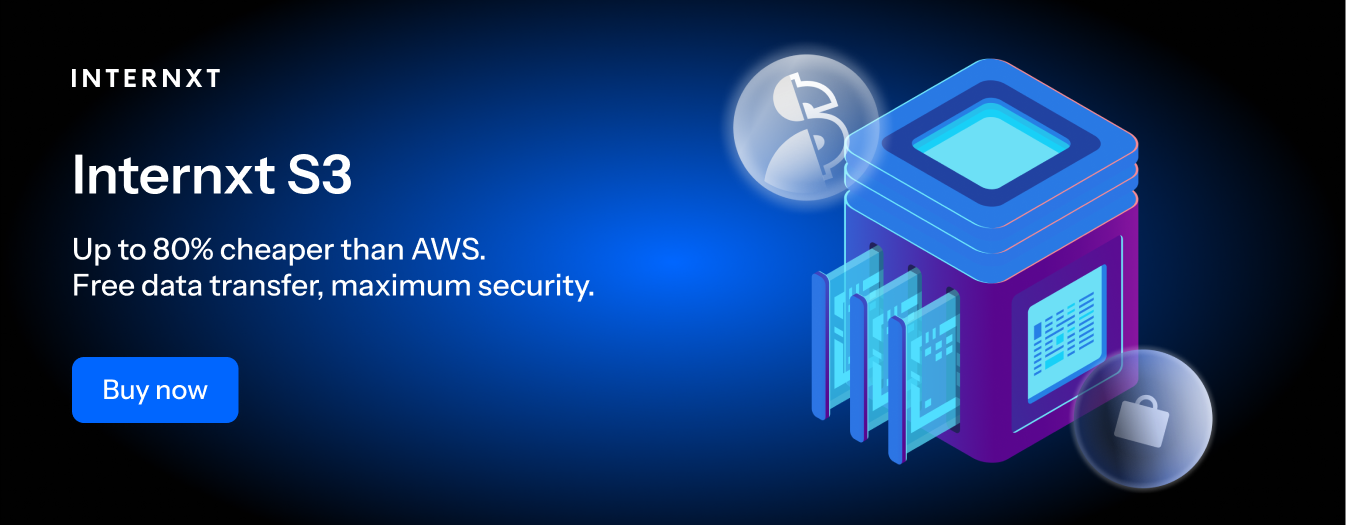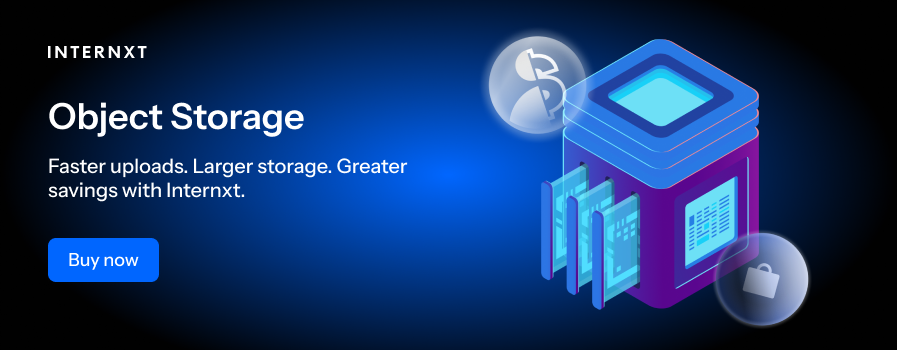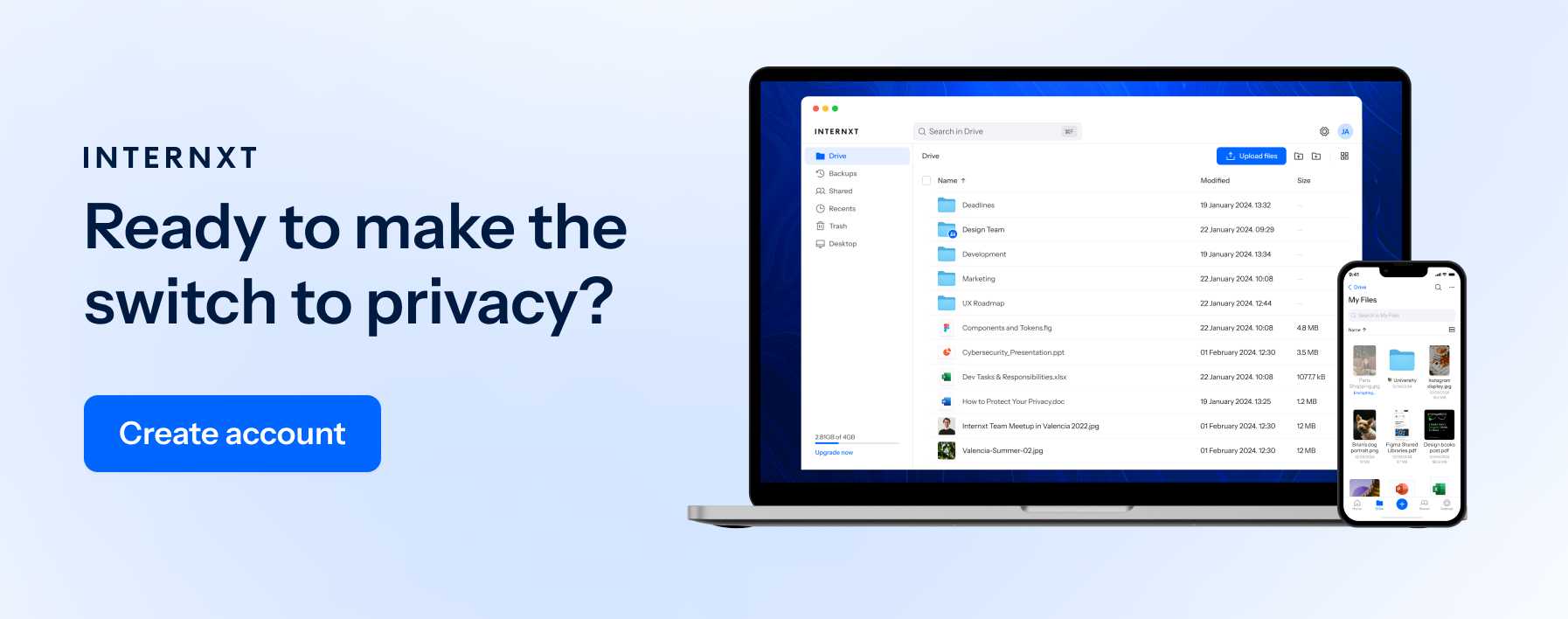Pros and Cons of Cloud Storage for Business: What to Consider

Over 60% of corporate data is stored in the cloud, and 89% of businesses are using a multi-cloud approach. The cloud infrastructure market is also projected to reach around $330 billion.
If your business or team is looking for the right cloud storage solution to protect your files or is looking to migrate data from your current cloud platform, it's important to weigh the pros and cons of cloud storage before committing to a decision.
This way, you can prevent data breaches, avoid hidden charges, or growing subscription costs by learning more about the pros and cons of cloud storage for business, as explained throughout this article.
By the end, you will be able to find the right cloud solution for your business and methods to prevent the cons of cloud storage from affecting your team.
Table of contents
- Cost
- Scalability
- Accessibility
- Collaboration
- Security
- Backups and disaster recovery
- Integration with other apps
- Data breaches
- Subscription charges or hidden costs
- Compliance challenges
- Migrating data
- Service downtime
Pros of cloud storage for business
First, let's consider why cloud storage is so popular for teams and businesses by looking at the pros of cloud storage for business.
Cost
Cloud storage providers offer businesses subscription-based payment plans so businesses can pick the right plan to meet their storage needs and gain access to other features. Another pro of cloud storage for business is that the cloud provider handles maintenance, server costs, etc, which can dramatically reduce your annual expenses.
Another option that could help your business manage costs is choosing a pay-as-you-go subscription model, such as that offered by Internxt S3 object storage. This model provides object storage for €7/TB/month and is perfect if you need hot cloud storage to quickly access large amounts of data.
As a result, Internxt S3 could save you up to 80% compared to AWS, Azure, or Google Cloud. Visit our website to talk to our sales expert for more information about how we can increase your business security, and save you money.

Scalability
Related to cost is the advantage of scalability when choosing cloud storage services to store your data.
Cloud storage can adapt to your business needs whenever you need. If you’re a start-up experiencing rapid growth, you can upgrade your storage to meet these requirements and adjust your resources in real-time.
This scalability means you get optimal performance during peak times and budget savings during off-peak times.
Accessibility
As the increase of remote working and digital nomads increases, it's become increasingly important for employees to access files from anywhere at any time, either with an internet connection or via offline access.
Cloud storage allows you to access and manage your files from Windows, Mac, Linux, or mobile devices, allowing you to access your account without being tied to a specific device or location.
Internxt Drive also offers WebDAV and Rclone support for increased file management and accessibility.
Collaboration
Collaboration in the cloud is made simple with features that allow team members to access, share, and edit projects in real time to ensure teams remain productive and on the same page.
Some collaboration features included in cloud storage are:
- Real-time file editing
- File syncing
- Version history and recovery
- Activity logs
- File commenting
Depending on the kind of cloud storage pricing offered, each provider has different features available, so you should consider these when considering the cost of cloud storage and other factors related to the pros and cons of cloud storage for business.

Security
The best cloud storage for sensitive data handles the security of your files through end-to-end encryption, converting private information into an unreadable format to prevent hackers and cyberattacks.
Zero-knowledge cloud storage, like Internxt Drive, offers increased privacy by giving you control over your encryption keys so nobody except you can view your files. Other companies, such as Google or OneDrive, manage these encryption keys, giving them access and control over your files and personal information.
Internxt's private and post-quantum encryption offers guaranteed protection for businesses against data breaches, with the advantage of GDPR compliance.
Backups and disaster recovery
Backing up files is an essential business practice that must be done to meet compliance laws and to recover files quickly should any external factors arise that could cause you to lose documents.
File backups also protect files against ransomware, the main threat businesses face to their data. In 2024, the average ransom payment almost doubled from the previous year to $2.73 million, and is expected to cost victims approximately $265 billion annually by 2031.
Internxt Drive allows for scheduled backups of your files so you can always recover your files in case of ransomware, corruption, or accidental deletion. It also includes Internxt VPN for paid plans, offering further protection from cyberattacks with an encrypted, private VPN.
For more information on the importance and features of backups with Internxt, visit our cloud storage backup solutions page.

Integration with other apps
Businesses can integrate and connect other tools into their cloud infrastructure for increased productivity and save time by having everything they need in one manageable platform.
It can also save money by reducing manual tasks from employees, as the cloud will handle these tasks, allowing your team to focus on other areas for increased efficiency.
By connecting cloud storage with other tools, employees can work within the apps they already use, reducing the need to switch between platforms and saving time.
With Internxt S3, you can integrate native Rclone support with this plan to manage and transfer your data between cloud storage and other services. Internxt Drive for Business lets you switch from your personal and business accounts so you can easily manage your personal and cloud accounts.
Cons of cloud storage for business
While the pros of cloud storage are evident, and will generally offer more benefits than disadvantages, it's important to consider both the pros and cons of cloud storage for business equally.
By doing so, you can choose the right service for you and take measures to prevent the potential cons of cloud storage from affecting your business.
Data breaches
Despite the many advantages of cloud storage, one disadvantage when considering the pros and cons of cloud storage for business is data breaches.
The average cost of a data breach reached almost $5 million in 2024, with healthcare data breaches being the most common.
One example of a cloud data breach is Snowflake Inc., a cloud-based data warehousing company that was targeted in a significant data breach affecting Ticketmaster, AT&T, Neiman Marcus, and others.
The main causes of data breaches include:
- Platform misconfigurations: Approximately 75% of security incidents are due to misconfigurations in cloud settings.
- Insider threats: These could be an intentional attack or accidental, but they account for about 30% of cloud security breaches. To prevent these, companies should carry out basic cybersecurity training emphasizing the importance of strong passwords and Multi-Factor Authentication, and consider implementing zero-trust policies.
- Access control vulnerabilities: 83% of cloud security breaches are linked to access-related vulnerabilities, such as unprotected file sending or other misconfigured controls.
Fortunately, Internxt’s Business plans include post-quantum cryptography, password-protected file sharing, access logs, and session management. With these, you have full access to your business cloud security, giving you the knowledge and security you need to protect against data breaches.
Subscription charges or hidden costs
One thing to monitor when choosing or activating your cloud storage is initial and hidden costs, especially if you choose a private or hybrid cloud storage model. The setup, maintenance, and future costs may not be feasible for a small to mid-sized business.
The initial setup in hardware, networking equipment, configuration, and software licenses for on-premise storage could reach over $90,000. There are also the ongoing costs of IT salaries, equipment upkeep, energy, and cooling costs, which average around $80,200 per year.
Compare this to Internxt S3, which handles all security, service, and maintenance costs for just €7/TB/month, translating to approximately €0.007 per gigabyte per month.

There are no hidden charges, so you could get unlimited storage to meet your needs at a fixed cost, which you can scale to meet your business needs.
Compliance challenges
Meeting compliance laws can be difficult if your team doesn’t have the knowledge of GDPR, HIPAA, or other relevant bodies. Another issue is that businesses may not have total control over their data in the cloud, making it harder for them to track and ensure that data is secure according to regulatory standards.
Having an understanding of which compliance laws you should follow, such as GDPR vs CCPA, will set your business up for success to protect data and avoid fines.
Migrating data
Migrating large amounts of data from one platform to another can cause significant challenges, such as data loss and business downtime. This process requires time, resources, and technical expertise to achieve successfully.
Migrating to the cloud could also lead to vendor lock-in, making it difficult to switch providers due to dependency on the platform’s tools, eventually leading to limited flexibility, hidden, or increased long-term costs.
Service downtime
Another risk to cloud storage is server downtime. If a cloud provider experiences technical issues or server downtime, it can lead to businesses not accessing critical data or services, which may cause lost revenue, damage their reputation, and customer complaints.
To help prevent these issues, however, Internxt S3 offers 11 nines of availability (99.999999999%) to minimize downtime and ensure that businesses experience minimal disruptions.
This high level of reliability ensures that data is accessible even during technical challenges, and all files stored with any Internxt plan are stored across multiple data centres for extra redundancy and security.
Debating the pros and cons of cloud storage
Now that we have considered all the pros and cons of cloud storage for business, it's clear that the pros outweigh the cons, especially if you choose a public cloud storage model, like Internxt Drive and S3.
By adhering to ISO 27001 compliance plus HIPAA, GDPR, and SOC 2 regulations, Internxt empowers your business to securely manage company and client data without compromise.
Internxt is a European tech company that offers a budget-friendly, large-scale data solution with S3, allowing you to securely store and back up your files and ensure GDPR compliance.

Internxt Drive for business also helps businesses prevent data breaches with state-of-the-art post-quantum encryption and zero-knowledge policies. These plans also come with a VPN and an Antivirus to protect your device from malware.
Visit our website to view our plans or to contact our sales team for more information.

